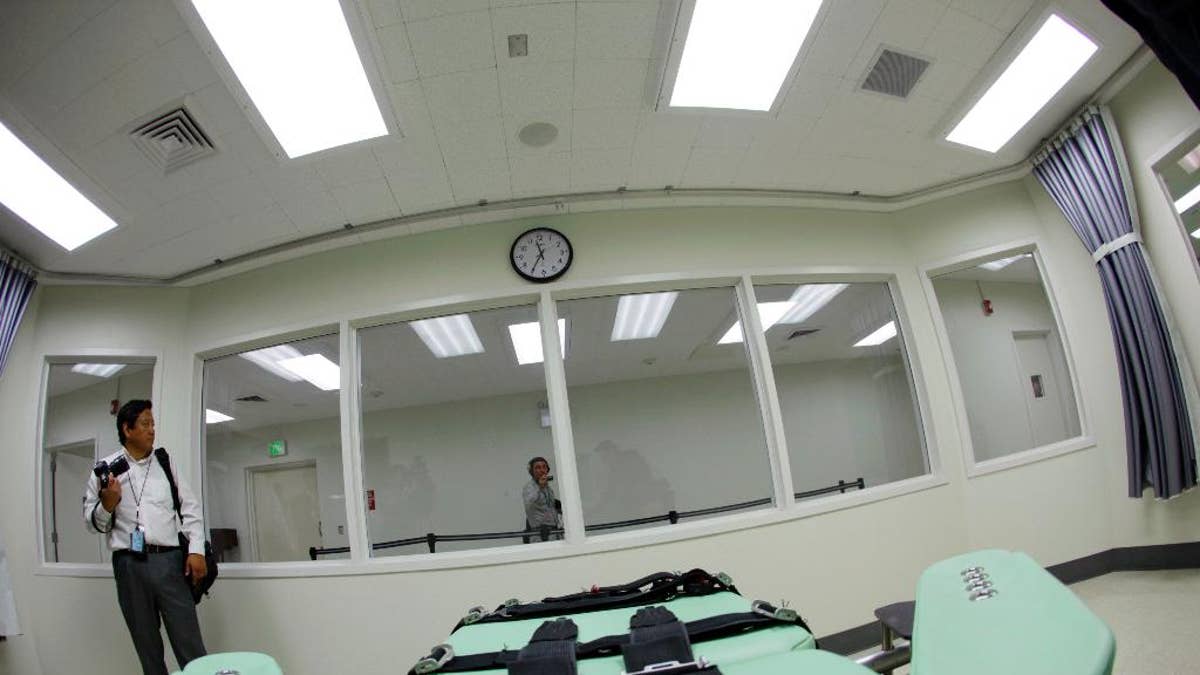
FILE - In this Sept. 21, 2010 file photo, the view a condemned inmate would have from a table inside the death chamber is shown during a tour of the new lethal injection facility at San Quentin State Prison in San Quentin, Calif. Death penalty supporters are setting the stage for a November showdown over whether to speed up executions in California or do away with them entirely. They'll be holding some 10 news conferences up and down the state on Thursday, May 19, 2016. (AP Photo/Eric Risberg, File) (The Associated Press)
SACRAMENTO, Calif. – Death penalty supporters are setting the stage on Thursday for a November showdown over whether to speed up executions in California or do away with them entirely.
Crime victims, prosecutors and other supporters plan to submit about 585,000 signatures for a ballot measure to streamline what both sides call a broken system.
No one has been executed in California in a decade because of ongoing legal challenges. Nearly 750 convicted killers are on the nation's largest death row, but only 13 have been executed since 1978. Far more condemned inmates have died of natural causes or suicide.
Supporters plan 10 news conferences statewide to promote an initiative they say would save taxpayers millions of dollars annually, retain due process protections and bring justice to murder victims and their families.
The measure would speed what is currently a lengthy appeals process by expanding the pool of appellate attorneys and appointing lawyers to the death cases at the time of sentencing.
Currently there is about a five-year wait just for condemned inmates to be assigned a lawyer. By contrast, the ballot measure would require that the entire state appeals process be completed within five years except under extraordinary circumstances.
To meet that timeline, appeals would have to be filed more quickly and there would be limits on how many appeals could be filed in each case.
Appeals currently can take more than two decades, according to the nonpartisan Legislative Analyst's Office.
"Justice denied is not justice," former NFL star Kermit Alexander said as he choked up while testifying at a legislative hearing on the measure this week. "My mother, sister and two little nephews still remain in their graves and my family is still having to fight for justice."
They were killed in South Central Los Angeles in 1984, and he has since become the proponent and most prominent public figure for the reform measure.
Additional provisions would allow condemned inmates to be housed at any prison, not just on San Quentin's death row, and they would have to work and pay victim restitution while they wait to be executed.
"What is the point of seeking the death penalty in the state of California if it doesn't work?" Sacramento County District Attorney Anne Marie Schubert, another proponent, asked at the same hearing.
Opponents say their measure, too, would save money by doing away with the death penalty and keeping currently condemned inmates imprisoned for life with no chance of parole.
They submitted about 601,000 signatures on April 28 with much less fanfare, said deputy campaign manager Quintin Mecke. Each side needs nearly 366,000 valid signatures to qualify for the ballot.
"It's unfortunate that the DAs (district attorneys) want to double down on a fundamentally broken death penalty system that simply can't be fixed," Mecke said. "You can't streamline or reform a failed policy."
A similar attempt to abolish the death penalty failed by 4 percentage points in 2012. Besides the latest initiative put forward by opponents, that failed effort spurred this year's counter-move by law enforcement and crime victims.

